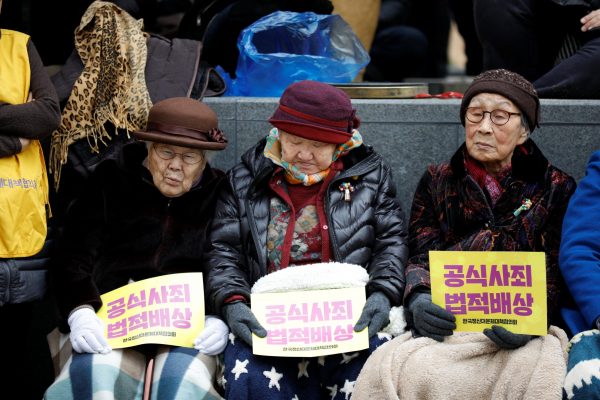The verdict may have serious consequences not only for Japan–South Korea relations but also for South Koreans’ faith in (and sense of pride for) the perceived strength of South Korean democracy.
In writing The Comfort Women of the Empire — published in South Korea in 2013 and in Japan in 2014 — Park studied archival documents and interviewed surviving comfort women to gain a better understanding of the lives of these women and how they were integrated into the structure of the Japanese Empire.
Park discovered that comfort women’s lives were, in reality, much more nuanced than what had been generally believed in South Korea.
The book distances itself from conventional understandings of comfort women as purely innocent victims of Japanese imperial power. Park described the collaboration of Koreans with private Japanese recruiters, as well as instances of comfort women having certain sense of partnership with Japanese men or volunteering themselves for the role.
Park’s book criticised those who disseminate an exclusive narrative of victimhood, which she believes is unnecessarily perpetuating the historical and emotional tensions underlying Japan–South Korea relations.
Consequently those activists who support this conventional narrative sued Park for defamation. On 18 November 2015 she was criminally indicted by a state prosecutor.
In protesting this indictment, Japanese, European and US intellectuals submitted an official statement in Park’s defence, of which the signatories now mount to 70.
After the turmoil of the Choi Soon-sil scandal and the demise of former president Park Geun-hye, on 25 January 2017 the Seoul District Court announced a not guilty verdict.
This was based on a decision that all statements referred to by the prosecution could not be considered as effective proof of defamation, and that there was no ground to consider that Professor Park had intent of defamation.
But the High Court still judged that Professor Park gave ‘false statements’ in her book because they do not converge with what the prosecutors believe to be the ‘correct’ view of South Korean history.
This reasoning is disturbing in its implications. It means that the state prosecution can decide that a certain view on an issue is the ‘correct’ one, and that anything that does not fall within these predetermined parameters can potentially be criminally indicted.
The larger political environment within which Park’s indictment is situated provides additional cause for concern.
Japan and South Korea came a long way in reaching the December 2015 reconciliation. But by the time of Moon Jae-in’s election in May this year, public opinion in South Korea had shifted towards total negation of this agreement.
This deteriorating political situation now requires extreme caution on both sides.
On the Japanese side, the South Korean government’s statement that ‘this issue is resolved finally and irreversibly with this announcement’ needs to be understood with a degree of common sense. Even if the two governments have reconciled at the political level, the wounds of the comfort women themselves might not be completely healed.
It is now the responsibility of the Japanese government and people to promote reconciliation on a societal level. The 14 August 2015 statement by Prime Minister Shinzo Abe indicates some awareness of this need: ‘Still, even so, we Japanese, across generations, must squarely face the history of the past. We have the responsibility to inherit the past, in all humbleness, and pass it on to the future’.
On the South Korean side, the responsibility is to create an environment where humble and sincere dialogue between both sides can actually take place. The criminalisation of South Korean views that are devoted towards achieving precisely this objective is in this respect highly concerning.
In Japan from 28 to 31 October, Asahi, Mainichi, Yomiuri and Sankei — major newspapers ranging from the left of the political spectrum to the right and that often take diametrically opposite positions on historical memory issues — all published editorials disagreeing with or denouncing the High Court verdict.
On 30 October Professor Park appealed the case to the Supreme Court of South Korea. It will be a shame if it does not have the courage to follow the wisdom shown at the District Court to restore domestic and international respect for the strength of South Korean democracy.
Kazuhiko Togo is Professor of International Politics and Director of the Institute of World Affairs, Kyoto Sangyo University.


Could I possibly be the only one who is wondering where are all those virtue signalling academics who signed the “OPEN LETTER IN SUPPORT OF HISTORIANS IN JAPAN” in 2015 when it comes to protesting the persecution of Park Yuha?
They seem to have one standard for Japan and another standard for Korea. There was and is no threat to open discourse on the comfort women in Japan. There was and is a very real threat to open discourse on the comfort women in Korea.